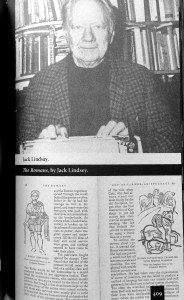 Jack Lindsay, the Australian-born British classicist, was awarded the Znak Pocheta (Badge of Honour) by the Soviet government in 1968. It was in the same year — following the Soviet invasion of Czechoslovakia — that Lindsay’s loyalty to the Soviet Union was stretched too far, although he never revoked his membership to the Communist Party of Great Britain (CPGB). About his biography of the Roman general and politician Mark Anthony, George Derwent Thomson — Professor of Greek at the University of Birmingham — effused: “What he has given us is of considerable value, suggestive and stimulating, especially to those who have not yet succeeded in shaking off the stultifying effect produced on their minds by the sort of Roman history they learned at school.” [1]
Jack Lindsay, the Australian-born British classicist, was awarded the Znak Pocheta (Badge of Honour) by the Soviet government in 1968. It was in the same year — following the Soviet invasion of Czechoslovakia — that Lindsay’s loyalty to the Soviet Union was stretched too far, although he never revoked his membership to the Communist Party of Great Britain (CPGB). About his biography of the Roman general and politician Mark Anthony, George Derwent Thomson — Professor of Greek at the University of Birmingham — effused: “What he has given us is of considerable value, suggestive and stimulating, especially to those who have not yet succeeded in shaking off the stultifying effect produced on their minds by the sort of Roman history they learned at school.” [1]
Thomson called the Late Roman Republic “an excellent field for Marxist research” and explained that the great merit of Lindsay’s book was that he “exposes the real nature of the forces that brought about the fall of the Republic”. Jack Lindsay, the son of the famous Australian artist Norman Lindsay (1879-1969), was born in Melbourne in 1900, and brought up from the age of five in Sydney. Despite a turbulent childhood which saw his father leave the family in 1905 and his mother succumb to alcoholism and mental illness in his teens, Lindsay – in the care of his Aunt Mary – showed early signs of academic brilliance and won a scholarship to Brisbane Grammar School.
He was from the beginning fascinated by Greece and Rome and especially the poetry and myths. His autobiography speaks of poetry and the classical world as an imaginative haven, a refuge from reality. Spending his meagre pocket-money mainly on broken-down editions of Everyman’s Library (including importantly their edition of Smith’s Classical Dictionary), he slaked his mounting thirst for all things classical and retreated further and further into the world of his classical imagination. Such a strong autodidactic streak in combination with his sound formal education at Brisbane and access to cheap books, continued to feed his love for poetry, both classical and British.
Lindsay’s bibliography defies bibliographers. Basically, he wrote a lot, and was as promiscuous in his publishing practice as he was prolific. Ben Harker (Manchester) has recently explained how “posterity has not [yet] been kind to Jack Lindsay”.[2] He is no longer in print, although some of his work is still of use to discrete scholarly disciplines. His book on ancient ballistics, for example, can still be found on some Ancient History reading lists, although colleagues in Ancient History tend to dismiss the vast majority of his work.[3] His classical translations, however, are for the most part excellent and still worth reading. As Harker shows, Lindsay was sidelined in his time, and does not generally appear “in traditions of Marxist thought in Britain today”. For a brief overview of Lindsay’s contribution to British classics in the 1930s, see Stead & Hall (2016) | PDF.
[1] LR (1937) 3.3.185.
[2] HWJ (2016) ‘Jack Lindsay’s Alienation’ August 7.
[3] Blast-Power & Ballistics Concepts of Force and Energy in the Ancient World (1978).




2 Comments
Helen Lindsay
October 23, 2016Hi – A friend sent me a link to your website, and there right at the beginning was a picture of my father, Jack Lindsay. Hurray! Its so good to see more stuff trickling out about his work. A book of his poetry was published last year by Andy Croft –
http://smokestack-books.co.uk/catalogue.php?search=Jack+Lindsay
An Australian academic Dr Anne Cranny-Francis is writing a book about his work, hopefully to be published next year, and I have organised for some of his historical novels to be published on-line with Endeavour press.
I think the subject and way in which its presented on your website is fantastic. I will send it round to others who may be interested. Good luck with the future progress of this project and if you want any further information about Jack and his work or anything else do get back in touch,
Best wishes
Helen
Josh S.
September 26, 2017Hello Helen,
Just as a chance event lead you to this webpage, a similar chance event has lead me to you. I’m a graduate student in Theater History, and I’m just finishing a short project about your father’s work translating Euripides for a performance in 1967. My university has a small collection featuring some of his correspondence, a program, and some newspaper reviews. From what little I’ve read, I enjoy very much your father’s contributions regarding Ancient Greek culture and literature.
While this brief project is nearing its end, I’d be interested to hear or learn more about your father if at all possible. Please let me know if this is something you are also interested in.
Kindest regards,
-Josh